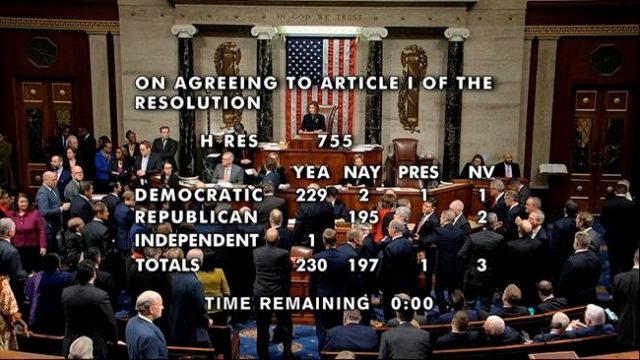… has really stepped on toes
by Omenihu Alfred
 The House of Representatives exercised its constitutional right to charge President Donald Trump with high crimes and misdemeanors through votes on two articles of impeachment hence impeaching him by the in a near party-line vote on the historic Wednesday December 18th 2019.
The House of Representatives exercised its constitutional right to charge President Donald Trump with high crimes and misdemeanors through votes on two articles of impeachment hence impeaching him by the in a near party-line vote on the historic Wednesday December 18th 2019.
Though he might seem unperturbed but I put it to you that Trump fully understands the magnitude of damage this impeachment has done to his presidency, political career and personal reputation. The recent CNN’s File unearthed of 2014 Fox News appearance Where Trump explained the damage impeachment would do to Obama. “He would be a mess. He would be thinking about nothing but. It would be a horror show for him. It would be an absolute embarrassment. It would go down on his record permanently.”
By this Donald Trump has become the third US president in history to be impeached by formal charge under the Constitution’s ultimate remedy for high crimes and misdemeanors in a historic vote in the House of Representatives after Andrew Jackson (March 15, 1767 – June 8, 1845) an American soldier and statesman who served as the seventh president of the United States from 1829 to 1837. Before being elected to the presidency, Jackson gained fame as a general in the United States Army and served in both houses of the U.S. Congress. Richard Milhous Nixon was an American politician who served as the 37th president of the United States from 1969 until 1974. Richard Nixon faced an impeachment inquiry, but he resigned before he could be impeached. William Jefferson Clinton is an American politician who served as the 42nd president of the United States from 1993 to 2001. Prior to his presidency, he served as governor of Arkansas and as attorney general of Arkansas
The former President Andrew Johnson was the first sitting president to ever face impeachment proceedings. It all began when he removed his Secretary of War Edward Stanton from office in 1867, which breached the Tenure of Office Act. The law meant he couldn’t fire any important officials without first getting Senate’s permission . At first, he’d suspended Stanton and replaced him, but when Congress intervened and reinstated Stanton, Johnson fired him on February 21, 1868. Three days later, on February 24, 1868, the House of Representatives impeached Johnson by a vote of 126-47. The House said he’d violated the law, and disgraced the United States’ Congress . From March to May 1868, over 11 weeks, the Senate tried Johnson’s case, and finally voted to acquit him. The vote was 35 guilty to 19 not guilty. One more guilty vote would have met the required two-thirds that’s necessary for a conviction .
Over 100 years later, the two-year crisis that would lead to Nixon’s resignation began on June 17, 1972, when five men were arrested after breaking into the Democratic National Committee’s headquarters at the Watergate hotel in D.C. They were caught trying to bug the building . A year later, on January 8, 1973, the trial for Watergate began. By the end of April, two senior White House officials and the attorney general had resigned over the controversy. The White House counsel was fired. In July, Nixon refused to hand over taped phone calls, which were thought to connect Nixon to the burglary and its cover-up. They are known as the “Nixon tapes.”
Nixon cited executive privilege as the reason for not handing them over to Congress (even under subpoena), and the Supreme Court later unanimously ruled that he had to. In October, more controversy followed, including several high White House officials resigning rather than following Nixon’s order to fire special prosecutor Archibald Cox, who was leading the investigation into misconduct by Nixon. This event was known as the ” Saturday night massacre .” A month after it, Nixon gave his famous line: “I am not a crook.” On May 9, 1974, the House Judiciary Committee began impeachment proceedings against Nixon. The House of Representatives authorized the proceedings with an overwhelming vote of 410-4.
By July 1974, the House Judiciary Committee found Nixon had obstructed justice, misused his power, and was in contempt of Congress. The three charges were sent to the floor for a full House vote. But before the house could vote to impeach Nixon, he resigned on August 8, 1974. He is the only president to ever resign.
President Bill Clinton is the most recent president to face impeachment proceedings. From early 1994, he was dealing with scandals, beginning with a financial investigation known as “Whitewater.” That same year, Paula Jones sued him, accusing the president of sexual harassment. Clinton argued he had presidential immunity from civil cases, but in 1997, the Supreme Court rejected his argument. In January 1998, during Jones’ case, Clinton denied under oath that he’d ever had an affair with White House intern Monica Lewinsky. But news of Clinton’s affair with Lewinsky got out. In July 1998, Clinton testified over the allegations that he’d committed perjury by lying about his affair with Lewinsky. And by August, he’d admitted to having an affair with Lewinsky. Lewinsky had also recorded conversations of her talking about the affair, and the transcripts of the conversation went public in October 1998. On October 8, 1998, just days after the tapes were released, the House of Representatives voted for impeachment proceedings to begin against Clinton. In a report released in September by independent counsel Kenneth Starr, there were 11 grounds for impeachment . On December 11, 1998, the House approved three articles of impeachment along party lines that Clinton had lied to a grand jury, he had committed perjury by denying his relationship with Lewinsky, and he had obstructed justice. The next day, a fourth article was approved, which accused Clinton of abusing his power .
On December 19, 1998, the House impeached Clinton for two of the articles perjury and obstructing justice. The votes were 228-206, and 221-212, also largely along party lines. Despite being impeached, Clinton refused to step down. Clinton was tried by the Senate and acquitted on February 12, 1999. His perjury charge had a vote of 55 not guilty to 45 guilty, and his obstruction of justice charge was 50 not guilty to 50 guilty. They didn’t meet the two-thirds majority necessary to convict
The historic vote split along party lines, much the way it has divided the nation, over a charge that the 45th president abused the power of his office by enlisting a foreign government to investigate a political rival ahead of the 2020 election. The House then approved a second charge, that he obstructed Congress in its investigation.
Donald Trump, who began tweeted his anger at the proceedings same December 18th, before he flew to Battle Creek, Michigan, for a political rally. He pumped his fist before an enthusiastic crowd, boasted of “tremendous support” in the Republican Party and said, “By the way, it doesn’t feel like I’m being impeached.”
And as the debate unfolded, Trump on Twitter called the proceedings “AN ASSAULT ON AMERICA” and on his party. A day before House of Representative voted in favour of his impeachment, Donald Trump wrote a strong-worded letter to House Speaker Nancy Pelosi. In the letter, Donald Trump said the impeachment proceedings against him are a “total sham”.
Donald Trump accused Nancy Pelosi of engaging in “perversion of justice” by allowing the impeachment proceedings. Denouncing the investigation, Trump said it is an “attempted coup” and said the Democrats are doing it to undo the 2016 US Presidential election when he defeated Democrat Hillary Clinton.
Meanwhile, on Tuesday, House Speaker Nancy Pelosi wrote a letter to all 232 Democratic members and urged them to abide by the constitution. The letter said: “Very sadly, the facts have made clear that President Donald Trump abused his power for his own personal, political benefit and that he obstructed Congress as he demanded that he is above accountability, above the Constitution and above the American people.”
Shortly before the process, Rep. John Lewis, the Georgia Democrat and Civil Rights icon gave a stirring speech in which he said history will remember this moment and lawmakers need to vote with that view in mind. “When you see something that is not right, not just, not fair, you have a moral obligation to say something, to do something. Our children and their children will ask us, what did you do? What did you do? For some, this vote may be hard, but we have a mission and a mandate to be on the right side of history.”
Trump was impeached on charges that he abused his power in office and obstructed Congress during the impeachment investigation. Democrats accused Trump of pressuring Ukraine to open an investigation into the president’s political rival and former vice president, Joe Biden, who is also a frontrunner in the 2020 Democratic presidential race. They also charge that the president obstructed their investigation by refusing to comply with subpoenas and directing members of his administration to do the same.
The impeachment inquiry, launched in September following a whistle-blower complaint, was centred on a July 25 phone call during which Trump asked Ukrainian President Volodymyr Zelenskyy to open an investigation into Biden and his son, Hunter, who had served on the board of a Ukrainian gas company. There has been no evidence of wrongdoing by the Bidens.
Trump also wanted Zelenskyy to investigate a debunked conspiracy theory that Ukraine, not Russia, interfered in the 2016 US presidential election.
At the time of the call, the Trump administration was withholding nearly $400m in Congress-approved military assistance from Ukraine.
Citing testimony by current and former US officials, Democrats also accuse Trump of leveraging a White House meeting that Zelenskyy wanted in exchange for the investigations.
The House passed two articles of impeachment charging Mr Trump with abusing power and obstructing Congress. The first article passed with 230 votes to 197, the second passed with 229 votes to 198. Impeachment in the House does not automatically result in removal from office. That decision is taken by the US Senate, which is set to hold a trial on Mr Trump’s fate in January. Article one, abuse of power, passed with 230 votes to 197. Two Democrats voted against it. Article three, obstruction of Congress, passed with 229 votes to 197. Three Democrats voted against.
In the biggest surprise of the night, Tulsi Gabbard, the Hawaii congresswoman running for the 2020 Democratic presidential nomination, voted ‘present’, meaning she did not back impeachment. She later explained that US voters should be allowed to decide Mr Trump’s fate in next November’s election. “My vote today is a vote for much needed reconciliation and hope that together we can heal our country,” she said in a statement. The vote plunges Mr Trump into uncharted political waters. No US president has ever won re-election after being impeached. Mr Johnson, impeached in 1868, failed to win his party’s next presidential nomination. Bill Clinton, impeached in 1998, stood down when his second term ended in January 2000.
After the vote, Mr Trump accused the Democrats of “illegal, partisan and unconstitutional” actions and vowed to exonerate himself in the ensuing Senate trial.
The articles of impeachment are now expected to be sent to the Senate, where senators will consider evidence, hear witnesses and vote to acquit or convict the president. The chief justice of the US Supreme Court presides over the trial. A two-thirds majority vote is required in the 100-member Senate to convict and remove a president from office. A conviction appears unlikely in the case of Trump. The Senate is made up of 53 Republicans, 45 Democrats and two independents who caucus with the Democrats. At least 20 Republicans would have to vote with all Democrats and the two independents to remove the president from office.
Senate Majority Leader Mitch McConnell has indicated that he would like swift proceedings, but the president has said he would not mind a robust trial, with testimony from a number of witnesses, including Biden and the whistle-blower whose complaint led to the impeachment inquiry.
Withholding the articles of impeachment may give the Democrats leverage when it comes to setting the procedures for the trial. Pelosi said Democrats will make a decision on next steps as “a group” but McConnell blasted the Democrats though for not immediately sending the articles to the Senate. He accused Pelosi of being afraid to send “their shoddy work product to the Senate”. “The framers built the Senate to provide stability, to keep partisan passions from boiling over,” he said from the Senate floor. “Moments like this are why the United States Senate exists.”
Reacting to that, Pelosi shot back, saying: “Frankly, I don’t care what the Repubicans say.” There’s no constitutional requirement that the House immediately send the articles of impechment to the Senate, according to scholars.
In any case, no firm date for a Senate trial has been set, but McConnell has said it will be the chamber’s “first order of business” upon returning to Washington, DC, in the New Year. Senate Democrats have proposed a trial plan that would see proceedings begin on January 6. Presentations by House managers, who would effectively work as prosecutors, would begin on January 9 under this plan. It is unlikely that Senate Republicans would agree to the Democrats’ exact proposal.
In the unlikely event that the Senate convicts and removes Trump from office, Vice President Mike Pence would become president and complete Trump’s term, which ends on January 20, 2021.










